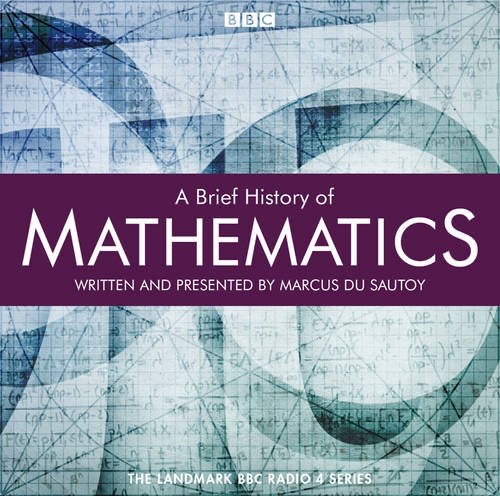

Another archival post, from several years ago.
I only saw one episode of the TV series Marcus Du Sautoy recently had on TV (must see if I can track it down on iPlayer!), and it was very interesting. So when this came up on Vine I jumped at the chance to get it.
Engaging for his boyish enthusiasm, Du Sautoy has a wonderfully straightforward, unpretentious delivery. This is very much a popular series for the uninitiated layman, although one hopes the boffins will also enjoy hearing their subject getting a popularist boost.
More than being an exposition of the hardcore technicalities of maths itself, this is a story of the people involved, and their contributions to the evolution of a branch of human inquiry that has, as time goes on, proved ever more intriguing, baffling, and yet also practical and enlightening. Du Sautoy makes some extravagant claims for maths, the “queen of the sciences”, quoting or paraphrasing Galileo, and portraying maths as the light that will illuminate us in our understanding of the otherwise dark and obscure maze of the world. Not being a mathematician, I can’t go as far or as confidently as Du Sautoy, but I think it’d be churlish not to agree that, whether you go all the way with him or not, maths is clearly hugely important in human development, and in the evolution of scientific understanding.
Over ten episodes Du Sautoy covers numerous stars of the mathematical firmament, starting with the controversy over ‘the calculus’, and who got there first; Leibniz or Newton? Whilst Newton voted himself (via his position in the Royal Society), official winner of the debate, Du Sautoy is, one feels, more in Leibniz’s corner. The story behind this is fascinating. He then goes on to cover such characters as Euler, amongst whose many achievements was a definitive solution to the ‘seven bridges of Königsberg’ conundrum, which has, so the series tells us, become fundamental to the workings of the internet!
Fourier’s work, as one of Napoleon’s “army of intellectuals”, on his ill-fated (albeit productive: the Rosetta stone was part of the booty) Egyptian campaign, was initially about the study of heat, but ultimately enlightend us about all kinds of waves, including light and sound. Brian Eno is brought in (each episode features a guest expert or two) to explain and demonstrate how Fourier analysis can be used in modern music, which, as a musician, I found very interesting.
I was aware of Gauss from my work as an illustrator (using Gaussian filters in Photoshop, for example), but learning how Gaussian distributions on graphs help statisticians model realistic patterns in apparently muddled data, and how this has become so useful in such areas of applied science as modern medicine, was very interesting. I always like to hear the back-story of great achievements, and Du Sautoy is “pained” that figures like Bolyai, Loachevski and Riemann, on whose shoulders Einstein (apparently not the greatest mathematician himself) and his theory of relativity rest, are not better known. Whether I’ll remember these new and obscure names, I don’t know, but their story is fascinating.
Du Sautoy always get most enthused when the maths is at its most ‘pure’: he loves Cantor and his infinity of infinities. This is an example where the concepts are easy enough for the general layman to understand, and yet touch on ideas that are either mind-blowing, or mind numbing, or possibly both (but in a good way). And then there’s Poincaré, whose errors in a theory submitted to a prestigious maths competition (set up by the then king of Sweden) ultimately gave rise to chaos theory. Here we touch on a subject we love so much in Britain: the weather! The systems work according to rules, but tiny variations in the variables can produce great differences in outcomes.
Some of the characters are tantalisingly, excitingly tragic, adding unexpected romance and pathos to the story of maths, such as the young Évariste Galois, killed aged 20 in a duel, whose insights have subsequently proven useful in physics, apparently working very well for the study of sub-atomic particles. Another touching story is that of Hardy, a pure mathematician who apparently didn’t care too much for the practicality of his maths (a trait of ‘real’ mathematicians Du Sautoy claims is of the utmost importance: practical benefits may come hundreds of years later), and his correspondence and working relationship with a self-taught Indian mathematician, Ramanujan. Both were to driven to despair, indeed, both attempted suicide (unsuccessfully) at different times in their lives, driven half-crazy by the ‘demonic’ primes. The fruits of their struggles? The complex codes that protect our personal data on the internet. Would Hardy have been pleased about this grubby commercial use of his obscure mathematical musings? Du Sautoy thinks not. But, whatever, the story is fascinating.
An excellent series from the good ol’ Beeb, proving that the license fee is still worth paying. I just wish there was more of this sort of thing on TV and radio. Well worth shelling out for.
